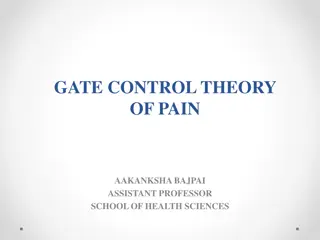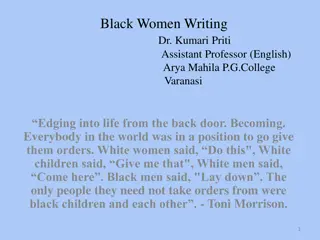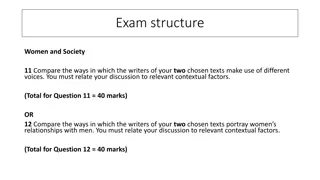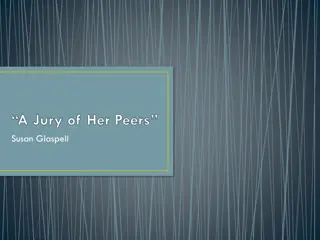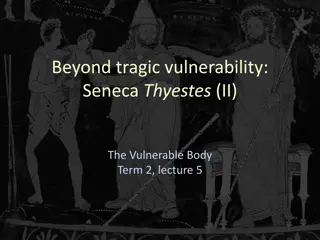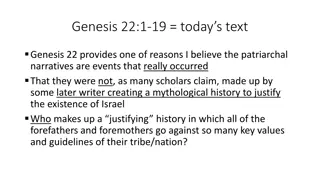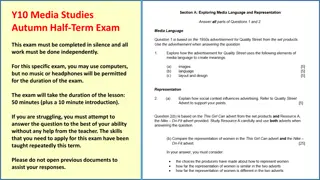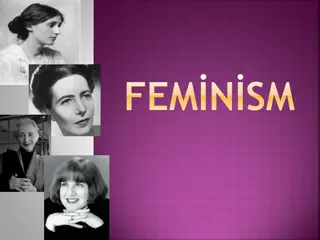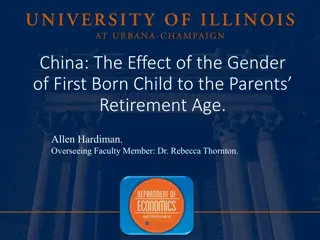Ginzburg Landau phenomenological Theory
The Ginzburg-Landau phenomenological theory explains superconductivity and superfluidity as distinct thermodynamic phases. It focuses on phase transitions characterized by singularities in specific heat at the transition temperature. Derived from BCS theory, it quantifies condensation energy, emphas
1 views • 38 slides
Crystal Field Theory in Transition Metal Complexes
Crystal Field Theory (CFT) explains the colors and magnetic properties of transition metal complexes. It focuses on the energy changes in d-orbitals of metal ions caused by surrounding ligands. This theory, developed in 1929, provides insights into the bonding interactions in complex compounds. The
10 views • 44 slides
Monumental Trees of Italy - A Natural Legacy of Grandeur and Cultural Significance
Italy boasts a rich heritage of monumental trees, defying the challenges of nature and human exploitation to grow into majestic and culturally significant specimens. These grand trees symbolize the enduring bond between nature and humanity, embodying naturalistic, aesthetic, and historical values. T
7 views • 23 slides
Understanding Social Learning Theory and the Power of Example
Social Learning Theory, introduced by Bandura, emphasizes learning through observation and modeling. It explores how individuals acquire behavioral dispositions, trial-and-error experiences, and the impact of stimuli in the environment. The theory focuses on the importance of attention, retention, a
1 views • 17 slides
Evolution of Mathematical Theories and Proof Systems
Development of mathematical theories such as model theory, proof theory, set theory, recursion theory, and computational complexity is discussed, starting from historical perspectives with Dedekind and Peano to Godel's theorems, recursion theory's golden age in the 1930s, and advancements in proof t
1 views • 29 slides
Introduction to Organizational Behavior: Management Theories and Practices
Explore the evolution of organizational behavior from early management theories to contemporary practices. Understand the historical foundations and relevance of management theory in shaping workplace dynamics. Delve into key concepts like Scientific Management, Administrative Management, Bureaucrat
1 views • 28 slides
Theories on the Origin of State: Divine, Force, Patriarchal, and More
Various theories such as Divine Origin, Force Theory, Patriarchal Theory, and others explain the origin of the state. Divine theories attribute state creation to God, while Force Theory emphasizes the strong subjugating the weak to establish authority. Each theory offers unique perspectives on the h
1 views • 24 slides
Understanding Forgetting: Theories and Influence on Memory Recall
Forgetting is a complex phenomenon influenced by theories such as Decay Theory, Interference Theory, and Motivated Forgetting. The Ebbinghaus forgetting curve highlights how memories fade over time. Decay Theory suggests memories decay over time, while Interference Theory explains how old and new me
0 views • 25 slides
Psychological Theories of Criminality: Understanding the Roots
Psychological theories of criminality delve into the association between intelligence, personality, learning, and criminal behavior. Major theories include Psychodynamic Theory by Freud, Behavioral Theory by Bandura, and Cognitive Theory by Kohlberg. These theories explore how unconscious mental pro
1 views • 20 slides
Austin's Theory of Law by Rinkey Sharma: An Overview
Austin's Theory of Law, presented by Rinkey Sharma, delves into the Imperative Theory of Law as proposed by Austin, known as the father of English jurisprudence. It explores General and Particular Jurisprudence, Austin's definition of law, and the elements of positive law, emphasizing the concepts o
0 views • 11 slides
Theories of International Relations Overview
The field of International Relations (IR) encompasses various theories that seek to explain global phenomena, drawing from disciplines like history, philosophy, and economics. Theory, derived from contemplation and speculation, organizes ideas to explain issues such as state emergence, conflict caus
1 views • 47 slides
Understanding the Gate Control Theory of Pain in Pain Management
This detailed content delves into the Gate Control Theory of Pain, explaining pain pathways involving nociceptors, A-delta fibers, and C fibers. It further explores central pain pathways like the spinothalamic tract, spinomesencephalic tract, and spinoreticular tract. The theory's mechanism of pain
3 views • 11 slides
Understanding the Theory of Firms: Neoclassical vs. Modern Approaches
The theory of firms is explored through the Neoclassical and Modern perspectives. Neoclassical theory focuses on profit maximization, while Modern theory delves into managerial, principal-agent, and transaction cost theories. The discussion covers criticisms of Neoclassical theory and the essential
1 views • 79 slides
Theories of Causation in Psychological and Social Sciences
Overview of theories of causation categorized into psychological, social psychological, and sociological perspectives. Psychological theories focus on instinctive, biological, and psychological qualities of abusers, including Attachment Theory, Psychodynamic Theory, Social Learning Theory, and Situa
0 views • 15 slides
Understanding Political Theory through a Contextual Approach
Exploring G.H. Sabine's perspective on political theory through a contextual approach, emphasizing the importance of historical context and societal influences. Sabine argues that while political theory evolves with its contemporary politics, it should be analyzed within its specific time and social
0 views • 9 slides
Evolution of Light Theory: From Wave Theory to Quantum Theory
At the turn of the century, the discovery of the photoelectric effect challenged the wave theory of light, leading to the development of the quantum theory by Max Planck and Albert Einstein. This new theory introduced the concept of discrete energy units known as quanta, bridging the gap between wav
1 views • 62 slides
Dp-branes, NS5-branes, U-duality, and M-Theory Overview
Overview of Dp-branes, NS5-branes, and U-duality derived from nonabelian (2,0) theory with Lie 3-algebra. Introduction to M-theory, including M2-branes and M5-branes in the strong coupling limit. Discussion on BLG theory, Lorentzian Lie 3-algebra, and the ABJM theory for M2-branes.
1 views • 32 slides
Evolution of Feminism Through Charlotte Perkins Gilman & Kate Chopin
First Wave Feminism focused on suffrage and legal rights in the 19th century. It later transitioned into the Second Wave critiquing patriarchal structures, with key figures like Betty Friedan and Gloria Steinem. Third-Wave Feminism emerged in the early 1990s addressing workplace harassment and power
6 views • 23 slides
Struggles of Black Women Against Racism and Oppression in America
The institutionalization of black slavery in America created a deep divide between whites and blacks. Racism ingrained in American history perpetuated the belief of black inferiority. Despite racial discrimination, black communities formed a strong identity post-abolition. Black women faced intense
0 views • 18 slides
Women in Afghan Society: Voices and Relationships Explored
A Thousand Splendid Suns portrays the lives of Mariam and Laila in war-torn Afghanistan, highlighting their struggles, relationships, and resilience against societal oppression and patriarchal norms. The novel delves into the intricate web of women's voices and relationships with men, weaving a narr
0 views • 40 slides
Historical and Cultural Context in Biblical Hermeneutics
Understanding the historical and cultural background is vital for interpreting biblical texts accurately. This includes exploring the relationship between history and literature, studying chronology, patriarchal periods, and significant events like the Exodus and United Monarchy. By delving into the
0 views • 48 slides
The Intriguing Story of "A Jury of Her Peers" by Susan Glaspell
Explore the captivating background of Susan Glaspell, the societal context she was writing in, the characters in her story, and the plot analysis of "A Jury of Her Peers." Dive into a narrative that reflects on gender roles, justice, and the power of women's perspectives during a time of patriarchal
1 views • 10 slides
Understanding Time-Independent Perturbation Theory in Quantum Mechanics
Perturbation theory is a powerful tool in solving complex physical and mathematical problems approximately by adjusting solutions from a related problem with known solutions. This theory allows for more accurate approximate solutions by treating the difference as a small perturbation. An example inv
0 views • 19 slides
Ethical Theories: Divine Command vs. Virtue Theory Explained
Divine Command Theory asserts that morality is derived from God's commands, contrasting with Virtue Theory which focuses on developing moral virtues to achieve human flourishing and excellence. Divine Command Theory relies on religious texts, while Virtue Theory emphasizes the cultivation of virtues
0 views • 24 slides
Understanding Fermi Liquid Theory in Interacting Fermion Systems
Fermi liquid theory, also known as Landau-Fermi liquid theory, is a theoretical model that describes the normal state of metals at low temperatures. Introduced by Landau and further developed by Abrikosov and Khalatnikov, this theory explains the similarities and differences between interacting ferm
0 views • 23 slides
Analysis of Lady Macbeth's Manipulation in Shakespeare's Macbeth
In a pivotal moment in Macbeth, Lady Macbeth's manipulation of her husband is showcased when she calls upon supernatural forces to overcome his kindness and convince him to kill Duncan. This extract is crucial in introducing Lady Macbeth's character and power dynamics within the play, particularly h
0 views • 49 slides
The Tragic Theme of Vulnerability in Seneca's Thyestes
Seneca's play Thyestes explores the theme of tragic vulnerability through the characters of Atreus and Thyestes. Atreus's quest for power and control is challenged by his own vulnerabilities, while Thyestes experiences a grotesque punishment that highlights the limitations of male generative power.
0 views • 8 slides
Genesis 22:1-19 - The Patriarchal Narratives: Events or Myths?
Genesis 22:1-19 presents a compelling argument for the authenticity of the patriarchal narratives, challenging the notion that they are merely mythological constructs. By examining various instances where key figures go against established values and guidelines, the text raises questions about the h
0 views • 29 slides
Analysis of Quality Street Advertisement: Media Language and Social Context
The examination of a Quality Street advertisement highlights how media language and social context are utilized to create meanings. Analysis includes the portrayal of characters, use of language, and layout design. The influence of the 1950s patriarchal society on advertising is discussed, showcasin
0 views • 6 slides
Computational Learning Theory: An Overview
Computational Learning Theory explores inductive learning algorithms that generate hypotheses from training sets, emphasizing the uncertainty of generalization. The theory introduces probabilities to measure correctness and certainty, addressing challenges in learning hidden concepts. Through exampl
0 views • 43 slides
Evolution of Feminist Literary Criticism: Challenging Patriarchal Ideals Through History
Feminist literary criticism challenges historical patriarchal views in literature from ancient Greek beliefs to modern writings. The roots of prejudice against women have been deeply embedded in Western culture, with notable works like Mary Wollstonecraft's "A Vindication of the Rights of Women" pio
0 views • 42 slides
Automata Theory and Theory of Computation Overview
This course overview covers concepts in automata theory and theory of computation, including formal language classes, grammars, recognizers, theorems in automata theory, decidability, and intractability of computational problems. The Chomsky hierarchy, interplay between computing components, modern-
0 views • 42 slides
Theories of Interest in Microeconomics II
Explore various theories of interest in economics, including the Classical Theory, Liquidity Preference Theory by Keynes, Productivity Theory, Abstinence Theory, Time-Preference Theory, Fisher's Time Preference Theory, and the Loanable Fund Theory. These theories offer different perspectives on the
0 views • 6 slides
Impact of Gender of First-Born Child on Parents' Retirement Age in China
The study explores the correlation between the gender of the first-born child and its impact on the retirement age of parents in China. With a focus on the societal norms influenced by the One Child Policy, the research delves into the gender discrimination and its effects, especially with a strong
0 views • 21 slides
Exploring the Evolution of Atomic Theory
Delve into the historical journey of atomic theory starting from Democritus and Aristotle's views to modern advancements proving some aspects of Dalton's theory incorrect. Learn about key laws and theories such as the Particle Theory of Matter, Dalton's Atomic Theory, and JJ Thomson's discoveries, s
0 views • 30 slides
Empowering American Muslim Women: Towards Gender Equality and Representation
This content highlights the challenges faced by American Muslim women in sacred spaces, advocating for gender equality and representation. It addresses the patriarchal mindset, lack of women's involvement, and the need for change, emphasizing inclusivity and empowerment through education and leaders
0 views • 18 slides
Promoting Gender Equality and Mental Health Awareness through Conversations
In a society where patriarchal attitudes and gender stereotypes persist, it is crucial for both men and women to engage in discussions to challenge these norms and promote equality. Men, facing mental health issues and societal pressures, are encouraged to participate in group discussions on topics
0 views • 7 slides
Macromechanical Analysis of Lamina and Tsai-Hill Failure Theory Overview
The Tsai-Hill failure theory is based on the strengths of a unidirectional lamina, incorporating longitudinal and transverse tensile and compressive strengths, as well as in-plane shear strength. This theory, derived from the distortion energy theory, provides criteria for determining lamina failure
0 views • 15 slides
The Byzantine Empire: Society, Achievements, and Decline
The Byzantine Empire, established in 527 A.C, was marked by religious conflicts and military advancements. The society was patriarchal, centered around Christianity, and had a hierarchical structure. The empire made significant progress in weaponry and trade, although frequent battles ensued. Despit
0 views • 7 slides
Understanding Different Management Styles and Their Concentration of Power
Different management styles, including charismatic, patriarchal, authoritarian, and bureaucratic, vary in their approaches to leadership and decision-making. Charismatic leaders focus on positive behavior and utilize persuasion, while patriarchal leaders make decisions alone in a familial setting. A
0 views • 5 slides











